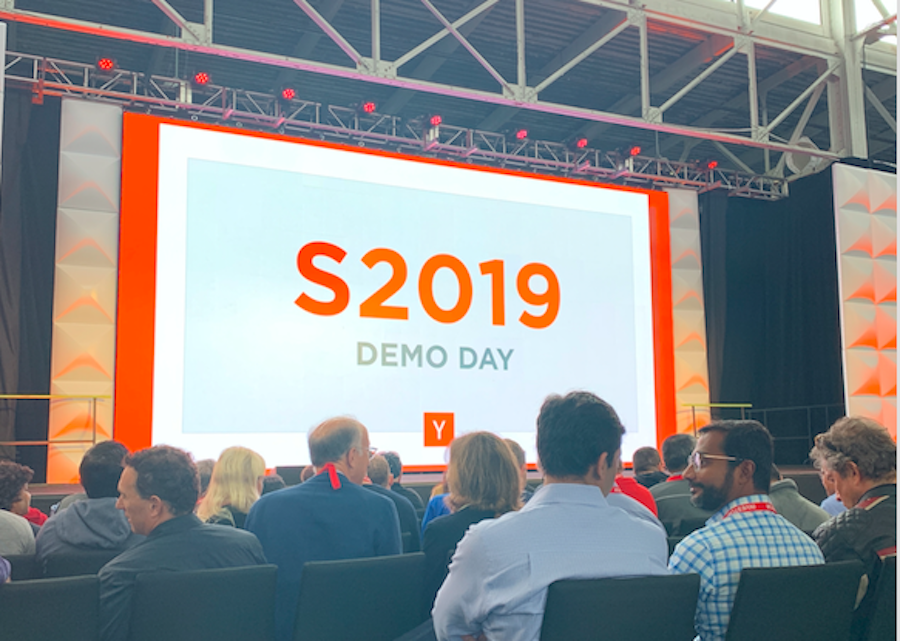I just attended my first Y Combinator (YC) Demo Day, and after listening to hours worth of pitches, networking at Pier 48, and even eating on-brand fortune cookies, I have thoughts.
Subscribe to the Crunchbase Daily
One startup wanted to innovate within toilet bowls. Another wanted to end Nike. And the other, naturally, wanted to increase a human’s lifespan. Of course, many cited Stanford to prove that they are worth venture capital money.

It was a full two days with about 197 startups individually pitching their companies to a room full of investors, entrepreneurs, and journalists. The startups are fresh off of a 12-week program filled with intensive workshops and networking.
So let’s look under the hood for a minute and check out some of the highlights.
The Portfolio Pleasers
Before Y Combinator kicked off its two-day event, CEO Michael Seibel said one of the biggest advantages of YC is access to customers. In other words, a YC company can tap into the network of thousands of YC companies.
But just in case that network isn’t enough, a handful of startups during Demo Day pitched their companies as beneficial to the portfolios of the dozens of venture capitalists in the room. Startups working to help startups is reminiscent of Brex, a credit card for startups and previous YC company.
Another startup that falls in this bucket is Embrace, which monitors social applications. Embrace co-founder Eric Futoran told investors “all your portfolio companies have mobile apps.”
“They all have bugs,” he said, before leaving the stage. “We’ll come and fix them.”
There was also Vouch, which sells insurance to startups, and Tandem, which offers a virtual office for remote teams and scored venture capital funding fresh out of the batch. The company raised $7.5 million in a round led by Andressen Horowitz, TechCrunch reported.
The YC Network: Friends Or Foes?
I wonder how many YC startups are taught to cite other YC startups as proof of their potential. Having a legacy to point to helps, I presume, when you’re a founder tackling a niche area.
ReverCare, which wants to broaden access to elder care services, said that it was connected with previous batch members also working to help the elderly.
Kiyan Rajabi, the co-founder of ReverCare, told me he was connected to Papa, a Y Combinator company from last year that offers “grandkids on-demand.”
Beyond that, PayMongo said it was Stripe (YC S2010) for the Philippines. Microverse said it was the Lambda School (YC S2017) for emerging countries. Hutsy said it was the Atrium (YC W18) for real estate.
Arguably the most famous YC grad, Airbnb, isn’t a hurdle to Globe, a company that unlocks space by the hour for business professionals.
“Globe will be bigger than Airbnb,” said Globe CEO and co-founder Emmanuel Bamfo multiple times from the stage. With Globe, users can book a room in someone’s home on the fly to nap or take a business call.
I caught up with Bamfo after his pitch. He said that Airbnb isn’t a competitor, just an example of an addressable market.
“Our users use us twice a week,” he said. “Airbnb users use them twice a year.”
Ironically, the summer batch kicked off its speaker series with a talk from Airbnb’s founders.
A Bigger Focus On India
This year, instead of offering to fly international companies to the U.S. to vet them as a potential batch member, YC went to India. This year’s batch had 11 India-based companies – an intentional focus for YC.
MyPetrolPump wants to help trucks get fuel faster. Also, around India, gasoline theft is an issue – there’s a black market of cylinders, Times of India reports. The addressable market, the company said, is $6 billion. It is currently serving 1,400 customers.
Then there’s Vahan, which is using WhatsApp to connect for-hire workers to on-demand companies. The company is hoping to tap into the 12 million on-demand workers hired in India every year, and then the 320 million low-skilled workers. It is currently making $30,000 in revenue, according to founder Madhav Krishna.
Krishna told me he is working closely with the WhatsApp team to further build out the company. In India, he said the messaging system is a core part of people’s lives.
Both YC CEO Seibel and YC President Geoff Ralston said their focus on India, and broader South East Asia, will continue.
This brings me to my next and final section. Seemingly as with every Demo Day, there are some startups that feel untraditional. And during a day with hours of pitches, I welcomed them with live tweets.
Finally, Some Honorable Mentions
A list of miscellaneous startups that left an impression on Day 2:
- Wren offers a monthly subscription to offset your carbon footprint. Instead of going vegan or buying a Tesla, the team suggested users subscribe to a $20/month model that plants trees based on your carbon footprint. The company is marketing itself to employers as a potential employee benefit, and has 503 paying subscriptions so far.

- Monaru wants to help millennials feel less lonely by offering recommendations and guidance on how to be social.
- Waves matches individuals with similar fetishes, with the hope of capitalizing on a missing element of conventional dating services. After launching three days ago, the company claims it has 751 users, and cites a potential $1.25 billion dollar industry.

And that’s a quick view at Y Combinator’s largest batch yet. More when one of the companies raises, becomes the next Airbnb, or beats it.
Photo by me.

Stay up to date with recent funding rounds, acquisitions, and more with the Crunchbase Daily.









![Illustration of pandemic pet pampering. [Dom Guzman]](https://news.crunchbase.com/wp-content/uploads/2021/03/Pets-2-300x168.jpg)

67.1K Followers